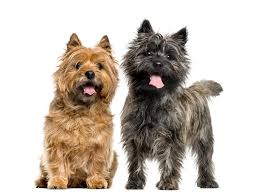
Cairn Terrier
Conditions of detention
Cairn Terriers are adaptable to various living conditions, including apartments and houses with yards. They need ample space to explore and play.
Useful Fact: Despite their small size, Cairn Terriers are highly energetic and benefit from regular exercise and mental stimulation.
Nutrition and diet
A balanced diet with high-quality dog food is essential for the Cairn Terrier. It’s important to include proteins, fats, carbohydrates, vitamins, and minerals in their diet.
Useful Fact: Overfeeding can lead to obesity, so portion control and regular feeding schedules are crucial for maintaining their health.
Health
Cairn Terriers are generally healthy but can be prone to certain genetic conditions, such as hip dysplasia, hypothyroidism, and eye disorders.
Useful Fact: Regular veterinary check-ups and early screening for hereditary issues can help manage and prevent potential health problems.
Grooming and care
The Cairn Terrier has a double coat that requires regular grooming. Brushing several times a week helps to prevent matting and keeps the coat healthy.
Useful Fact: Professional grooming, including stripping the coat a few times a year, maintains the breed’s characteristic appearance.
Education and training
Cairn Terriers are intelligent and eager to learn, responding well to positive reinforcement training methods. Consistency and patience are key.
Useful Fact: Early socialization and training can help manage their natural hunting instincts and ensure good behavior around other pets and people.
Toys and entertainment
Cairn Terriers enjoy interactive and challenging toys that stimulate their mind and body. Puzzle toys, fetch, and agility training are ideal.
Useful Fact: Regular playtime helps to prevent boredom and can curb potential destructive behaviors.
Safety
Being curious and adventurous, Cairn Terriers should be supervised during outdoor activities. A secure yard is essential to prevent them from wandering off.
Useful Fact: Leash training is important to keep them safe during walks and prevent them from chasing small animals.
Accessories
Sturdy collars, leashes, and harnesses designed for small but strong dogs are suitable for Cairn Terriers.
Useful Fact: Using a harness can provide better control and prevent strain on their neck during walks.
Socialization
Socialization from an early age is crucial for Cairn Terriers. Exposure to different environments, people, and animals helps them develop a well-rounded temperament.
Useful Fact: Positive experiences during socialization can reduce anxiety and prevent aggressive behaviors in new situations.
Travel and Transportation
Cairn Terriers are generally good travelers, especially if acclimated to it early. They should be transported in secure, comfortable crates or carriers.
Useful Fact: Regular breaks during long journeys can help them stay comfortable and reduce stress.
Behavior and psychology
Cairn Terriers are known for their bold, cheerful, and independent nature. They are affectionate with their families and enjoy being involved in daily activities.
Useful Fact: Understanding their need for both independence and companionship can help in creating a balanced and happy environment for them.
Legal aspects
Ownership regulations for Cairn Terriers may vary by region, but adherence to local laws regarding pet registration, vaccinations, and leash laws is important.
Useful Fact: Keeping updated identification and health records can help ensure compliance with legal requirements and safeguard the dog’s wellbeing.


